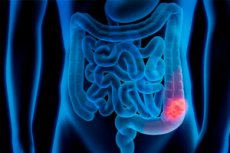New publications
Abdominal pain and bloody stools are important signs of early bowel cancer
Last reviewed: 02.07.2025

All iLive content is medically reviewed or fact checked to ensure as much factual accuracy as possible.
We have strict sourcing guidelines and only link to reputable media sites, academic research institutions and, whenever possible, medically peer reviewed studies. Note that the numbers in parentheses ([1], [2], etc.) are clickable links to these studies.
If you feel that any of our content is inaccurate, out-of-date, or otherwise questionable, please select it and press Ctrl + Enter.

In a recent review published in JAMA Network Open, a team of researchers discussed the symptoms and signs commonly seen in patients with early colorectal cancer, how these signs relate to disease risk, and the variations in time from the onset of first symptoms to diagnosis.
Recent trends show that while colorectal cancer rates are declining among older adults, the incidence of early colorectal cancer diagnosed in people under 50 is rapidly increasing. Research suggests that early colorectal cancer rates could increase by 140% by 2030.
These alarming predictions have led to an update of colorectal cancer screening guidelines, starting screening at age 45 for those at moderate risk of the disease. Moreover, early detection of the disease is a priority, as patient survival is significantly higher with early diagnosis and treatment.
Delays in diagnosis can be due to various reasons, such as doctors’ lack of knowledge about symptoms, patients’ underestimation of the severity of symptoms, or failure to recognize common signs of the disease. Therefore, it is important to better understand the common symptoms and signs of early colorectal cancer.
Description of the study
The aim of this study was to answer three questions through a systematic review and meta-analysis of studies on early colorectal cancer. First, to identify the most common symptoms and signs in patients with early colorectal cancer. Second, to understand the association between these symptoms and the risk of developing early colorectal cancer. Third, to investigate the time interval between the first onset of symptoms and diagnosis.
The review included studies reporting any symptoms or signs of non-hereditary colorectal cancer in people under 50 years of age. Studies with fewer than 15 patients or those where the majority of patients were under 18 years of age were excluded.
Information was extracted from the studies on the proportion of patients with early colorectal cancer who experienced each symptom or sign, an estimate of the risk of the disease based on these symptoms, and data on the time from symptom onset to diagnosis.
Research results
The results showed that more than 50% of patients with early colorectal cancer complained of abdominal pain and hematochezia (blood in the stool), and 25% of patients experienced changes in bowel habits.
Hematochezia was associated with a 5- to 54-fold increased risk of colorectal cancer, and abdominal pain was associated with a 1.3- to 6-fold increased risk. In addition, a delay of 4- to 6-months between the onset of symptoms and diagnosis was common.
Some studies suggest that younger people may have a longer time to diagnosis than middle-aged patients. However, other studies suggest that the later stages of the disease in younger patients may be due to other genetic and biological factors rather than delays in diagnosis.
Conclusion
The findings highlight the need for physicians to consider early colorectal cancer in their differential diagnosis when patients present with features such as hematochezia or abdominal pain. Additional tests such as colonoscopy, ultrasound, and CT scan should be considered to confirm or exclude early colorectal cancer.
Overall, the study results show that symptoms such as abdominal pain and hematochezia occur in more than 50% of patients with early colorectal cancer, and a quarter of them experience changes in bowel habits. When these symptoms are present, doctors should conduct additional tests to confirm or exclude early colorectal cancer and avoid further delays in diagnosis.
